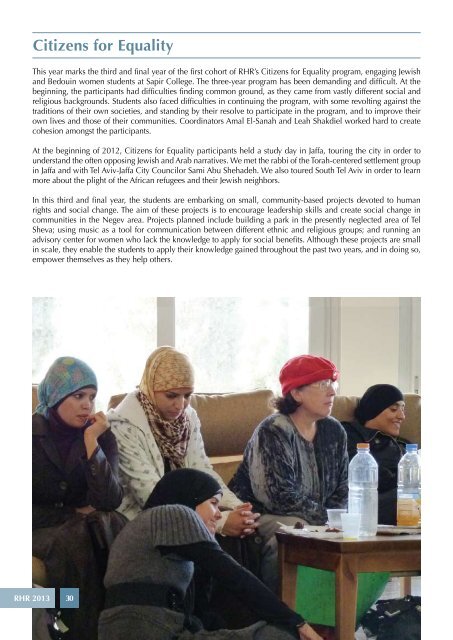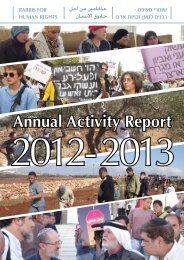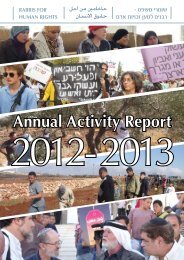2012- 2013
Create successful ePaper yourself
Turn your PDF publications into a flip-book with our unique Google optimized e-Paper software.
Citizens for Equality<br />
This year marks the third and final year of the first cohort of RHR’s Citizens for Equality program, engaging Jewish<br />
and Bedouin women students at Sapir College. The three-year program has been demanding and difficult. At the<br />
beginning, the participants had difficulties finding common ground, as they came from vastly different social and<br />
religious backgrounds. Students also faced difficulties in continuing the program, with some revolting against the<br />
traditions of their own societies, and standing by their resolve to participate in the program, and to improve their<br />
own lives and those of their communities. Coordinators Amal El-Sanah and Leah Shakdiel worked hard to create<br />
cohesion amongst the participants.<br />
At the beginning of <strong>2012</strong>, Citizens for Equality participants held a study day in Jaffa, touring the city in order to<br />
understand the often opposing Jewish and Arab narratives. We met the rabbi of the Torah-centered settlement group<br />
in Jaffa and with Tel Aviv-Jaffa City Councilor Sami Abu Shehadeh. We also toured South Tel Aviv in order to learn<br />
more about the plight of the African refugees and their Jewish neighbors.<br />
In this third and final year, the students are embarking on small, community-based projects devoted to human<br />
rights and social change. The aim of these projects is to encourage leadership skills and create social change in<br />
communities in the Negev area. Projects planned include building a park in the presently neglected area of Tel<br />
Sheva; using music as a tool for communication between different ethnic and religious groups; and running an<br />
advisory center for women who lack the knowledge to apply for social benefits. Although these projects are small<br />
in scale, they enable the students to apply their knowledge gained throughout the past two years, and in doing so,<br />
empower themselves as they help others.<br />
Interfaith<br />
Portrait of one of our young rabbis/rabbinical students:<br />
Debbie Shoua-Haim<br />
I was born and raised in Jerusalem. I’m married to Alon and I live in Jerusalem. Prior<br />
to working at RHR, I was trained as a Jewish studies teacher and taught in various<br />
Jerusalem high schools. I’m finishing my MA in Bible Studies and am planning to<br />
study for the rabbinate over the coming years.<br />
My work at RHR (in the Education Department) has opened up my eyes to see more<br />
and more wrongs in our society and has opened my heart to feel the suffering of others. I learn from<br />
RHR’s more experienced rabbis and employees about justice, morality and fighting for worthy causes.<br />
In my work I truly feel that I have a chance to make a difference in the way that young people, high<br />
school and university students perceive the importance of human rights, their connection to the Jewish<br />
tradition, and the duty we all have to fight for them.<br />
RHR’s Interfaith work is mainly led by Rabbi Yehiel Grenimann, and we work in a variety of interfaith<br />
capacities. We are part of the “Tag Meir” (light tag) coalition of organizations (see below), and we also<br />
have several interfaith projects involving young religious students and leaders.<br />
Tag Meir<br />
RHR organized and participated in several<br />
activities of "Tag Meir" (light tag), a coalition<br />
of organizations that respond to so-called “Tag<br />
Mekhir” (price tag) Jewish terror and violence<br />
against Palestinians, refugees and migrants,<br />
and others in Israel and the West Bank. In June<br />
<strong>2012</strong>, we participated in a Tag Meir event at<br />
Neve Shalom, at which RHR board member<br />
Rabbi Gil Nativ spoke. In September <strong>2012</strong>,<br />
in response to the desecration and attempted<br />
arson of Latrun Monastery, we joined in an<br />
interfaith prayer held at the monastery. Earlier,<br />
at the end of 2011, RHR organized solidarity visits to the villages of Asira al-Qibliya and al-Burka. In<br />
Asira al-Qibliya we visited with a family who had been subjected to many violent attacks by settlers from<br />
the nearby outpost of Yitzhar. In addition to words of support and commitment to peace and justice,<br />
we donated a barbed-wire fence to help protect them from the ongoing violence from their neighbors.<br />
In al-Burka we visited the mosque, which had been subject to arson only a week before. We brought<br />
them new books of the Qur’an, replacing those destroyed in the fire and again both sides spoke of their<br />
commitment to peace and coexistence. It was most heartening to see many young people participating<br />
and the warm reception from our Palestinian hosts.<br />
RHR <strong>2013</strong> 30<br />
31 RHR <strong>2013</strong>









